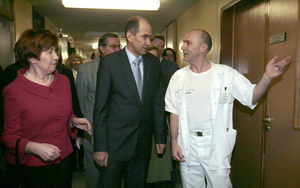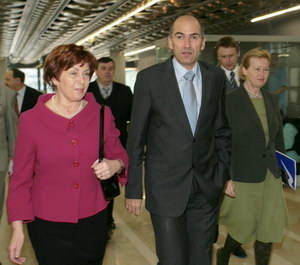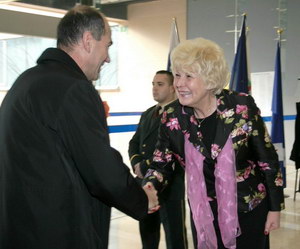The Prime Minister of the Republic of Slovenia, Mr Janez Janša, today visited the University Medical Centre Ljubljana (UMC), together with the Minister of Health, Mrs Zofija Mazej-Kukovič, and the Director-General of the Health Insurance Institute of Slovenia, Mr Samo Fakin. The Prime Minister was given a tour of the Intensive Care Unit, and subsequently held a meeting with the UMC management at which he was informed about the achievements, but also some problems, of the University Medical Centre.

Prime Minister Janez Janša also visted the Intensive Care Unit. (Photo: Bor Slana/Bobo)
After the meeting, Mr Janša stressed that the University Medical Centre Ljubljana was a institution of strategic importance within the Slovenian health system; in terms of the achievements of its experts in a number of fields, it ranked among the top institutions in Europe and the world. He also noted his satisfaction at the presentation of results of the UMC’s scientific research, with experts involved in many European and global scientific projects tackling some of the most demanding issues and attaining distinguished results. “This is an area which has not been at the forefront of discussions in Slovenia lately, but which nonetheless testifies to the high quality of Slovenia’s health system,” said the Prime Minister.

Prime Minister Janez Janša and general director of the UMC Darinka Miklavčič (Photo: Bor Slana/Bobo)
The UMC’s operation, which is on the national scale, covering almost half of the whole country in terms of patient numbers, gives rise, in the Prime Minister’s words, to a range of problems related to finance, human resources and premises. “We talked chiefly about how to address these problems. First, how to tackle problems stemming from certain long-term forecasts – chief among them, increased needs for this type of medical activity in the years to come. And, secondly, we openly discussed specific problems related to the conclusion of certain investment projects and to the evaluation of health programmes,” explained the Prime Minister. He assessed today’s meeting as very constructive both thanks to the Government’s strategic planning and preparation of solutions for organising the healthcare network in Slovenia and thanks to the preparations for framing a law on general practitioners’ services.

(Photo: Bor Slana/Bobo)
The items discussed at the meeting with the UMC management also included the evaluation of certain programmes. In this regard the Prime Minister expressed his belief that it would be possible in the course of this year to deal with the loss sustained by the UMC. He further emphasised that within the system as a whole there were still reserves which needed to be identified, the guiding principle in this regard being the needs of patients.
The Prime Minister stressed that staff problems involved not only a shortage of doctors but also a shortage of healthcare staff. “In recent years, we have been solving this problem by increasing capacity – establishing a medical faculty in Maribor and ensuring higher enrolment there and also setting up schools specialising in healthcare and schools for nursing staff and ensuring higher enrolment there too.”

Prime Minister Janez Janša and medical director of the UMC Aleksandra Markovič MD(Photo: Bor Slana/Bobo)
In his statement after the talks, Mr Janša also touched on the question of remuneration in healthcare. “Here, legislation needs to be amended in order to ensure better conditions for solving this problem and enabling employers of doctors to have a greater flexibility when deciding on rates of remuneration for doctors,” said the Prime Minister.